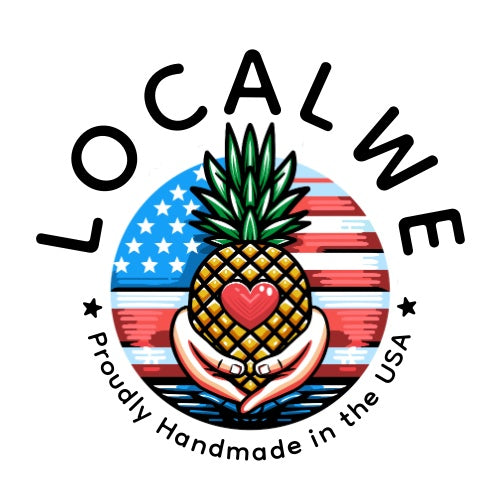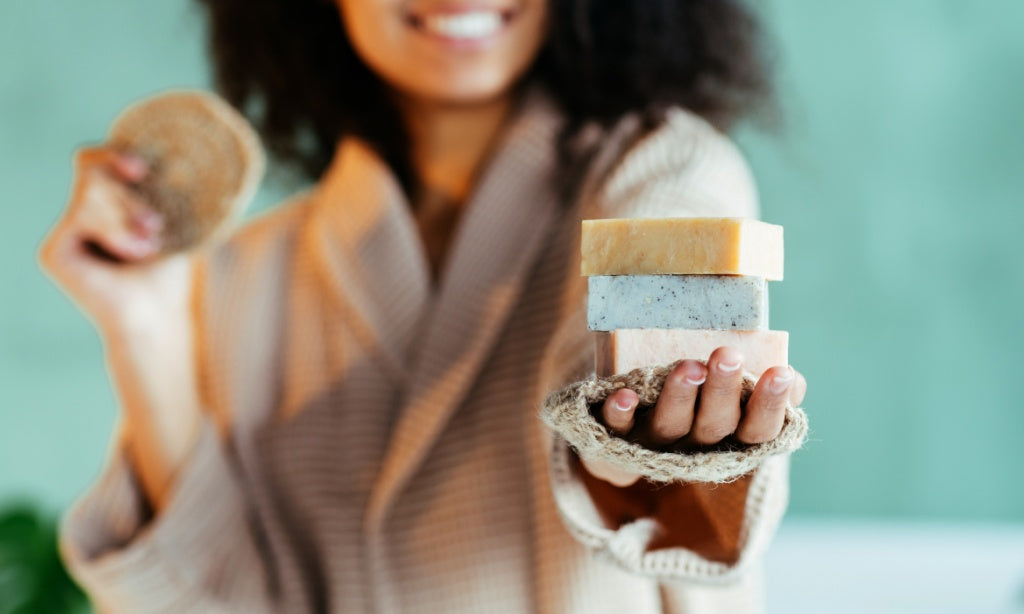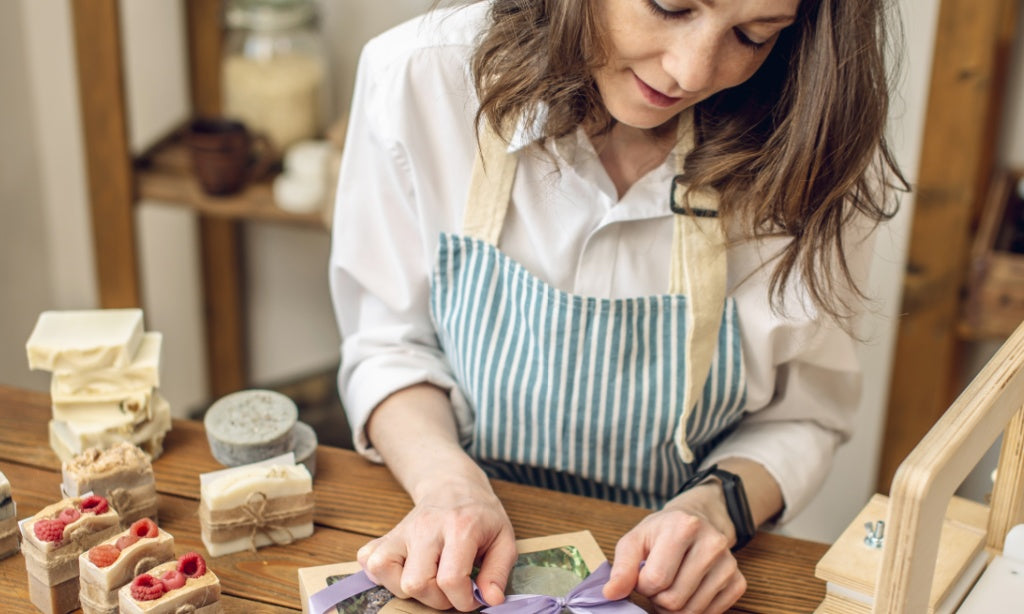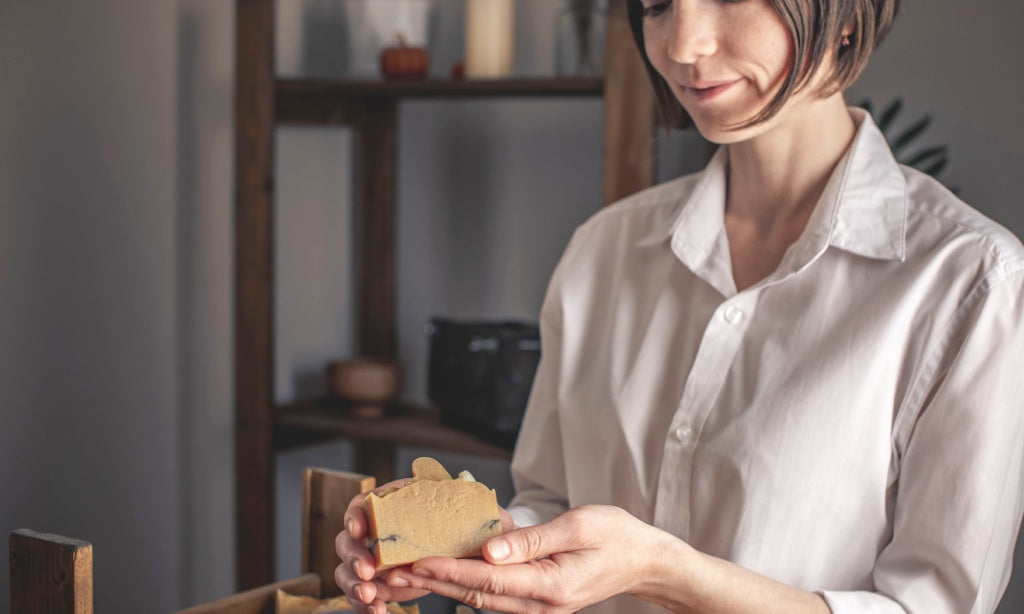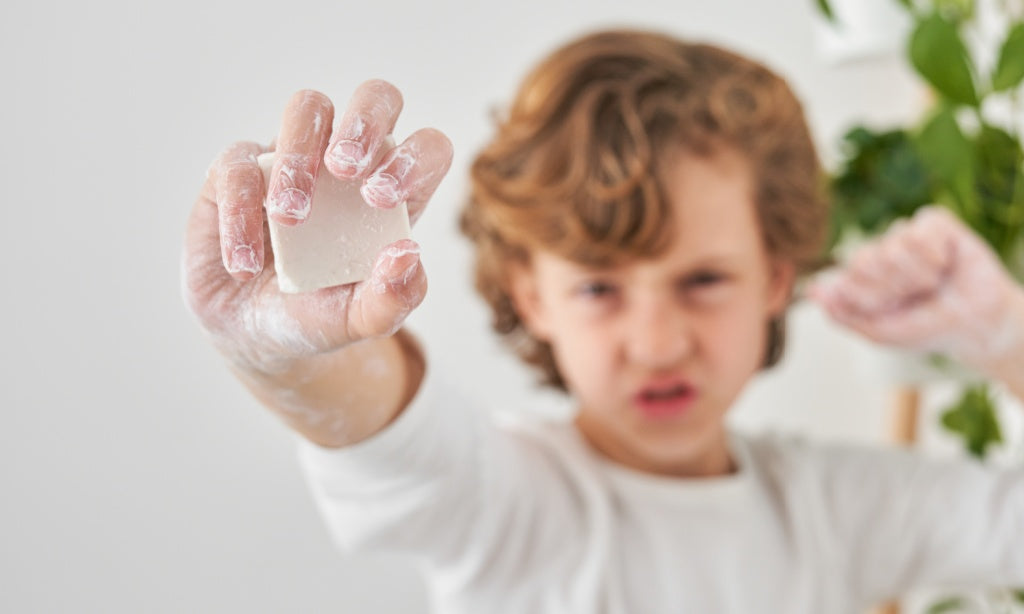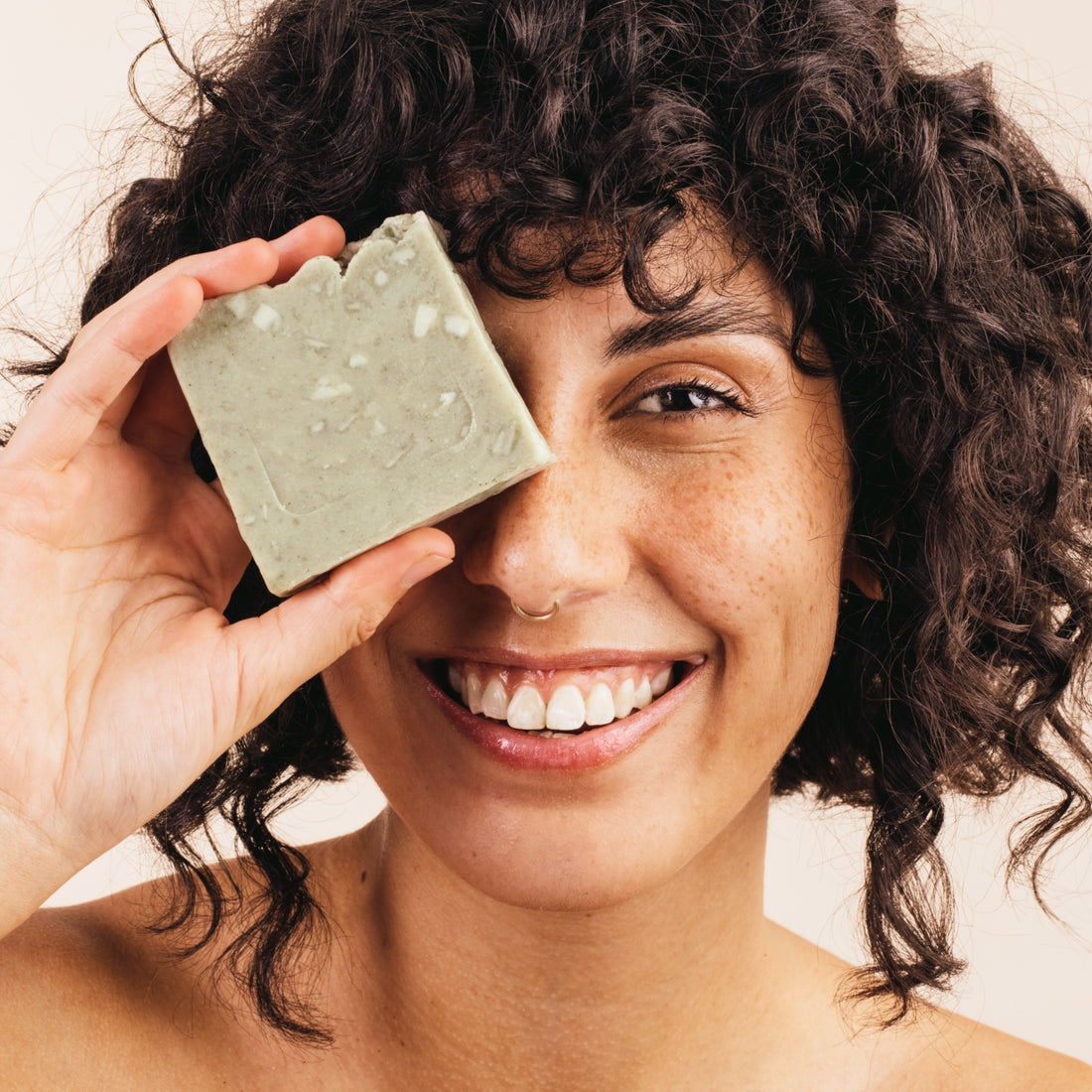
Unlocking the Secrets of Handmade Soap: A Comprehensive Guide
Share
In today's saturated market of skincare products, handmade soap stands out as a beacon of natural goodness and skin-loving benefits. Crafted with care and attention to detail, handmade soap offers a plethora of advantages over its commercial counterparts.
In this guide put together by LocalWe, we'll explore the benefits of using handmade soap, delve into its common ingredients, address concerns about sensitive skin, compare its longevity with commercial soap, and investigate its potential to alleviate specific skin conditions. Let's embark on a journey to discover the wonders of handmade soap.
What are the benefits of using handmade soap?
Handmade soap offers a myriad of benefits, setting it apart from mass-produced commercial soap:
Natural Ingredients in Handmade Soaps
Handmade soap is a testament to the beauty of nature's bounty, as it is meticulously crafted from a harmonious blend of natural oils, botanical extracts, and essential oils. These wholesome ingredients are carefully selected for their nourishing properties, ensuring that each bar of soap is a luxurious treat for the skin. From the rich, moisturizing qualities of olive oil to the cleansing power of coconut oil and the soothing effects of shea butter, handmade soap offers a symphony of goodness derived directly from nature's treasure trove.
In addition to oils, handmade soap often incorporates botanical extracts such as chamomile, calendula, and lavender. These botanicals infuse the soap with their unique benefits, imparting soothing, anti-inflammatory, and antioxidant properties to pamper the skin. Furthermore, essential oils lend their enchanting scents and therapeutic qualities to the soap, transforming each bathing experience into a sensory delight.
With its reliance on natural ingredients, handmade soap provides a gentle yet effective cleansing experience that leaves the skin feeling soft, supple, and moisturized. Unlike commercial soaps laden with harsh detergents and chemicals, handmade soap respects the skin's delicate balance, ensuring that it is cleansed without stripping away its natural oils. Instead of resorting to synthetic additives, handmade soap harnesses the power of nature to cleanse and rejuvenate the skin, resulting in a radiant complexion and a renewed sense of well-being.
Gentle Cleansing
Handmade soap goes beyond mere cleansing, offering a nourishing feast for the skin that promotes overall health and radiance. Enriched with a plethora of oils, botanicals, and essential oils, handmade soap delivers a potent dose of nutrients directly to the skin, replenishing moisture, and revitalizing tired, dull-looking complexions.
The oils used in handmade soap, such as olive oil, coconut oil, and shea butter, are renowned for their moisturizing properties, deeply hydrating the skin and locking in essential moisture. These oils are rich in vitamins, antioxidants, and fatty acids, which work synergistically to repair and protect the skin from environmental damage, leaving it soft, supple, and resilient.
Skin Nourishment
Enriched with oils and botanicals, handmade soap delivers essential nutrients to the skin, promoting overall skin health and radiance. In addition to oils, handmade soap often incorporates botanical extracts known for their skin-loving benefits. Calendula, with its soothing and anti-inflammatory properties, helps to calm irritated skin and promote healing, while lavender offers a sense of relaxation and tranquility, making each bathing experience a luxurious treat for the senses.
Furthermore, essential oils not only lend their enchanting scents to handmade soap but also provide therapeutic benefits for the skin. Tea tree oil, for example, boasts powerful antibacterial and antifungal properties, making it ideal for acne-prone or problematic skin, while peppermint oil offers a cooling sensation that invigorates the senses and refreshes the skin.
By nourishing the skin with a wealth of natural ingredients, handmade soap promotes overall skin health and radiance, leaving it looking and feeling its best with every use.
Environmentally Friendly Handmade Soaps
In a world increasingly concerned with sustainability and environmental conservation, handmade soap shines as a beacon of eco-friendliness and conscientious consumerism. Crafted with sustainability in mind, handmade soap embodies the principles of reduce, reuse, and recycle, offering a planet-friendly alternative to mass-produced commercial soaps.
One of the hallmarks of handmade soap is its minimal packaging, which helps to reduce waste and minimize its environmental footprint. Unlike commercial soaps, which often come encased in layers of plastic packaging, handmade soap is typically wrapped in biodegradable materials or presented without excessive packaging, allowing consumers to enjoy their skincare rituals guilt-free.
In addition to its eco-friendly ingredients and packaging, handmade soap supports local artisans and small businesses, fostering a sense of community and connection within the local economy. By supporting handmade soap makers, consumers can feel good about their purchases, knowing that they are contributing to a more sustainable and environmentally conscious way of life.
What ingredients are commonly used in handmade soap?
Handmade soap incorporates a variety of natural ingredients to pamper the skin:
Handmade Soaps: Oils
Olive Oil in Handmade Soaps
Renowned for its moisturizing properties, olive oil is a staple in handmade soap recipes. Rich in antioxidants and vitamins, it nourishes the skin, leaving it soft and supple.
Coconut Oil in Handmade Soaps
Coconut oil creates a rich, creamy lather that cleanses the skin deeply without stripping away its natural oils. It's prized for its antibacterial and antifungal properties, making it an excellent choice for maintaining skin health.
Palm Oil in Handmade Soaps
Palm oil lends hardness and stability to handmade soap, ensuring that it maintains its shape and longevity. It produces a luxurious lather that gently cleanses the skin, leaving it feeling refreshed and revitalized.
Shea Butter in Handmade Soaps
Extracted from the nuts of the shea tree, shea butter is a decadent addition to handmade soap. Its high concentration of vitamins and fatty acids provides intense hydration, making it ideal for dry or sensitive skin types. Shea butter also possesses anti-inflammatory properties, soothing irritation and promoting skin healing.
Handmade Soaps: Botanicals
Incorporating botanical extracts into handmade soaps adds an extra layer of nourishment and indulgence. These natural ingredients are carefully chosen for their soothing, moisturizing, and rejuvenating effects on the skin.
Chamomile Handmade Soaps
Known for its calming properties, chamomile soothes sensitive or irritated skin, making it perfect for those prone to redness or inflammation. Its gentle, anti-inflammatory nature helps alleviate discomfort and promote skin healing.
Calendula Handmade Soaps
Calendula, or marigold, is prized for its anti-inflammatory and antiseptic properties. It soothes dry or damaged skin, reducing redness and irritation while promoting skin regeneration. Calendula-infused soap is particularly beneficial for soothing minor wounds, eczema, or dermatitis.
Lavender Handmade Soaps
Lavender essential oil is a versatile botanical ingredient cherished for its relaxing aroma and skin-soothing properties. It calms the mind and body while helping to reduce inflammation and promote skin repair. Lavender-infused soap is an excellent choice for winding down after a long day and nurturing stressed or sensitive skin.
Handmade Soaps: Essential Oils
Essential oils not only impart delightful scents to handmade soap but also offer a plethora of skin benefits. From calming the senses to combating bacteria, these aromatic extracts enhance the overall sensory experience while addressing various skincare concerns.
Tea Tree Handmade Soaps
Tea tree essential oil is prized for its powerful antibacterial and antifungal properties. It helps combat acne-causing bacteria, regulate oil production, and soothe inflamed skin. Tea tree-infused soap is an excellent choice for individuals with acne-prone or oily skin.
Peppermint Handmade Soaps
Peppermint essential oil provides a refreshing sensation and invigorates the senses. Its cooling properties soothe itching or irritation, making it ideal for hot summer days or post-workout showers. Peppermint-infused soap revitalizes the skin, leaving it feeling refreshed and energized.
Handmade Soaps: Natural Colorants
Natural colorants elevate the visual appeal of handmade soap while offering additional skincare benefits. These plant-based ingredients provide vibrant hues and textures without the need for artificial dyes, ensuring a truly natural and artisanal experience.
Herbs in Handmade Soaps
Dried herbs such as rosemary, lavender buds, or chamomile flowers not only add visual interest but also provide gentle exfoliation and aromatherapy benefits. They infuse the soap with their natural fragrance and enhance its therapeutic properties.
Spices in Handmade Soaps
Ground spices like turmeric, cinnamon, or paprika impart warm, earthy tones to handmade soap. Rich in antioxidants and vitamins, spices offer skin-nourishing benefits while adding a touch of rustic charm to the soap.
Clays
Clays such as kaolin, French green clay, or rhassoul clay are prized for their purifying and detoxifying properties. They draw out impurities from the skin, leaving it cleansed, clarified, and refreshed. Clays also provide natural color and texture to handmade soap, creating a luxurious bathing experience.
Plant-Based Powders
Powders derived from plants like spirulina, matcha, or beetroot offer vibrant colors and skin-loving properties. They provide antioxidant protection, promote skin regeneration, and lend a beautiful hue to handmade soap without synthetic additives. Plant-based powders are a popular choice for creating natural, eco-friendly soap formulations.
Is handmade soap better for sensitive skin than commercial soap?
Handmade soap is a preferred choice for sensitive skin due to its gentle formulation:
Gentle Formulation in Handmade Soaps
Handmade soap is free from harsh chemicals and synthetic fragrances commonly found in commercial soap, making it less likely to cause irritation or allergic reactions.
Handmade Soaps and Moisturizing Properties
The nourishing oils and botanicals in handmade soap help hydrate and soothe sensitive skin, reducing dryness and discomfort.
Customizable Recipes
Artisan soap makers can tailor their recipes to cater to sensitive skin, omitting potential irritants and incorporating gentle ingredients known for their calming and soothing properties.
How long does handmade soap last compared to commercial soap?
Handmade soap typically lasts longer than commercial soap due to its concentrated formulation:
Denser Formulation
Handmade soap is denser and more concentrated than commercial soap, resulting in a longer-lasting bar.
Absence of Fillers
Handmade soap lacks fillers and preservatives commonly found in commercial soap, allowing it to maintain its quality and effectiveness for an extended period with proper care.
Can handmade soap help with specific skin conditions like acne or eczema
Handmade soap holds promise as a natural remedy for various skin conditions, including acne and eczema. Here's how handmade soap can be beneficial for managing these specific skin concerns:
Acne
Handmade soap formulations often incorporate ingredients known for their acne-fighting properties. For instance, tea tree oil is renowned for its antibacterial and anti-inflammatory effects, which can help combat acne-causing bacteria while reducing redness and inflammation.
Activated charcoal, another common ingredient in handmade soap, acts like a magnet to draw out impurities, excess oil, and toxins from the pores, effectively cleansing the skin and preventing breakouts.
Additionally, handmade soap enriched with clay varieties such as kaolin or bentonite can help absorb excess oil and unclog pores, promoting clearer, healthier-looking skin.
The gentle cleansing action of handmade soap removes dirt, grime, and makeup without stripping the skin's natural moisture, which is essential for maintaining a balanced complexion and preventing acne flare-ups.
Eczema
Individuals with eczema often experience dry, itchy, and inflamed skin, making them particularly sensitive to harsh chemicals and irritants commonly found in commercial soap. Handmade soap, on the other hand, is crafted with natural ingredients known for their soothing and moisturizing properties.
Shea butter, a common ingredient in handmade soap, is rich in vitamins and fatty acids that nourish and hydrate the skin, helping to alleviate the symptoms of eczema and restore the skin's moisture barrier.
Oatmeal, another key ingredient in handmade soap, contains anti-inflammatory compounds that soothe irritated skin and relieve itching associated with eczema. Its gentle exfoliating properties help remove dead skin cells, promoting healthier skin regeneration.
Calendula, a botanical extract often used in handmade soap, possesses anti-inflammatory and antimicrobial properties that can help calm inflammation and prevent bacterial infections, which may exacerbate eczema symptoms.
By incorporating handmade soap into their skincare routine, individuals dealing with acne or eczema can benefit from the gentle yet effective cleansing, nourishing, and soothing properties of natural ingredients. While results may vary depending on the severity of the condition and individual skin sensitivities, many people find relief and improvement in their skin health with regular use of handmade soap. As with any skincare product, it's essential to patch-test new formulations and consult a dermatologist for personalized advice and treatment recommendations.
Can children or people with allergies use handmade soap safely?
Handmade soap is formulated with natural ingredients and is generally safe for children and individuals with allergies. Here's a more detailed exploration of their safety:
Children
Handmade soap is often milder and gentler than commercial soap, making it suitable for children's delicate skin. However, it's essential to consider the age of the child and any specific allergies or sensitivities they may have. For infants and toddlers, it's advisable to choose unscented or lightly scented varieties to minimize the risk of irritation. Additionally, always supervise young children during bath time to prevent accidental ingestion of soap.
Allergies
People with allergies can use handmade soap safely, provided they are mindful of their specific sensitivities. Artisan soap makers typically disclose all ingredients used in their products, allowing consumers to make informed choices based on their allergies. It's essential to read the ingredient list carefully and avoid soaps containing allergens such as nuts, dairy, gluten, or fragrances that may trigger allergic reactions. Conducting a patch test before using a new soap can help determine any adverse reactions before full-body use.
Sensitive Skin
Individuals with sensitive skin or conditions like eczema can benefit from using handmade soap, as it is less likely to contain harsh chemicals and irritants found in commercial soap. Look for handmade soaps specifically formulated for sensitive skin, often enriched with soothing ingredients like oatmeal, chamomile, or aloe vera. Patch testing is especially crucial for those with sensitive skin to ensure compatibility with the soap's ingredients.
Prioritize Your Skin’s Health
In conclusion, handmade soap offers a natural, skin-loving alternative to commercial soap, with benefits ranging from gentle cleansing and nourishment to suitability for sensitive skin and therapeutic properties for specific skin conditions. By embracing handmade soap, you not only prioritize your skin's health but also contribute to a more sustainable and eco-friendly approach to personal care. Make the switch to handmade soap today and experience the wonders it can work for your skin and the planet.
LocalWe offers a collection of handmade soaps made by local artisans and small businesses in the USA.
